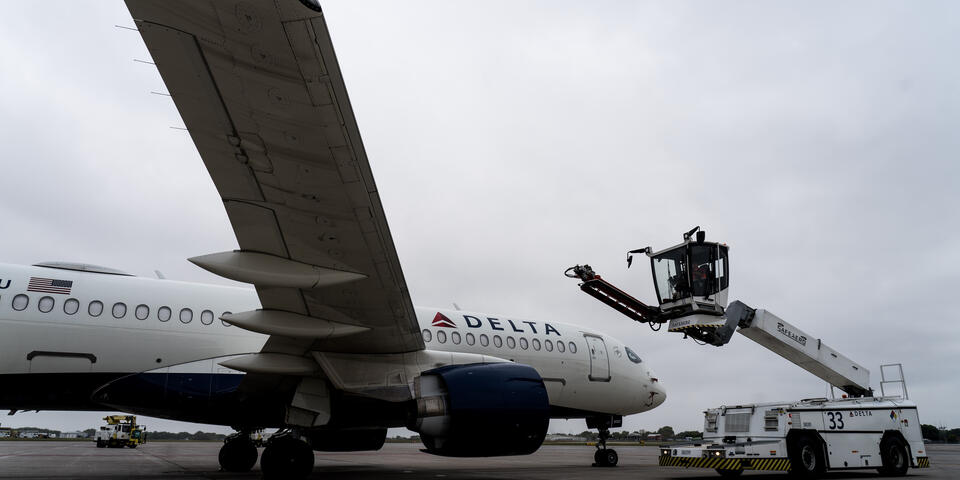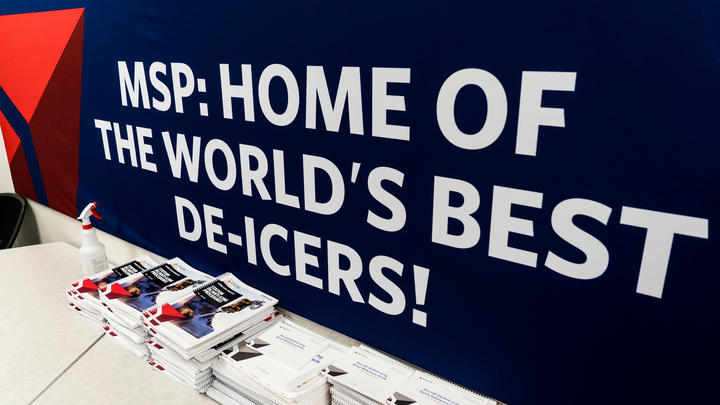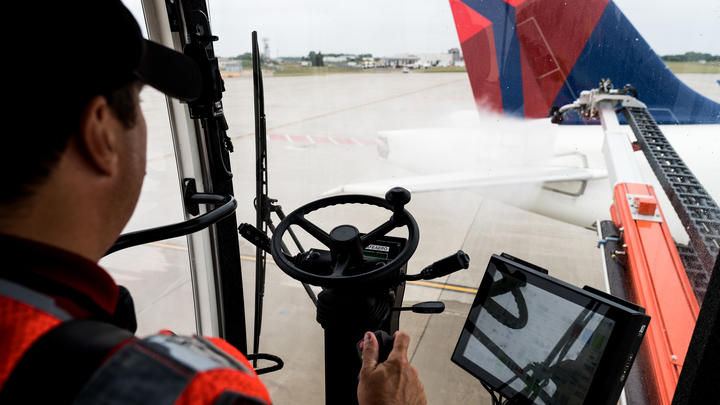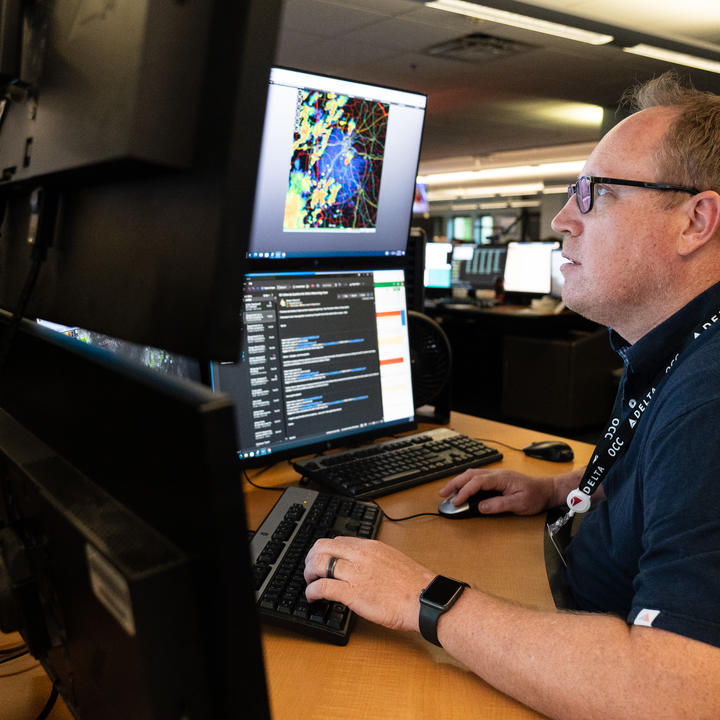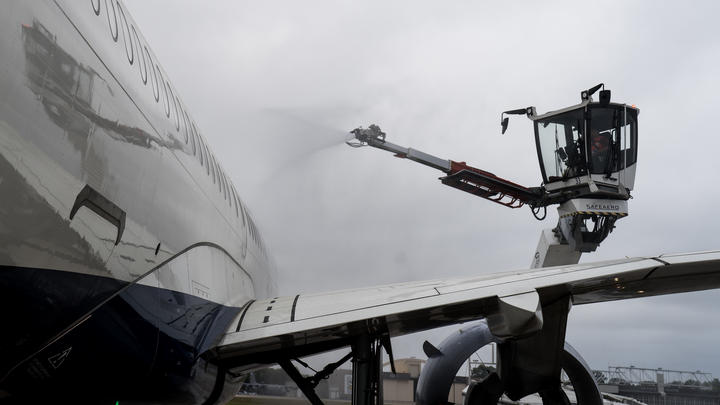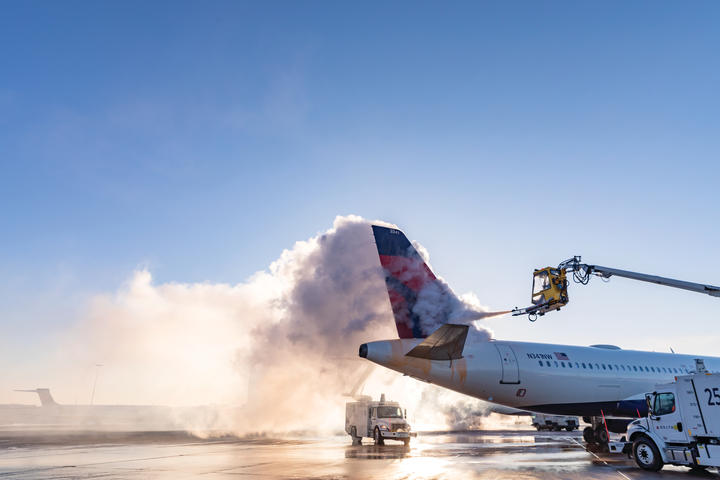A boot camp like no other: Delta people hone deicing skills in Minneapolis
Delta’s hub at Minneapolis-Saint Paul International Airport is “home of the world’s best deicers.” If the winter months are their regular season, summer is time for boot camp – getting trained and ready for the winter ahead.
As you enter Delta’s deicing facility on the outskirts of Minneapolis-Saint Paul International Airport (MSP), a banner proudly proclaims, “Home of the world’s best deicers.” The sign is a rallying message not only for the deicers of MSP, but all of Delta’s deicers, no matter where they’re based. Delta people from around the operation – from Alaska to Florida – converge at MSP every summer to learn the latest techniques and protocols for deicing aircraft.
The top priority: ensuring a safe and smooth operation through the winter months.
Delta’s deicing teams at MSP bring a lot of experience. More than 250 Delta employees at MSP are deice trained. During the 2022/2023 winter season, they deiced 14,040 departing planes at MSP – more than 20% of the 65,538 total Delta flights deiced across the operation, and far more than any other station. Delta’s hub at Detroit Metropolitan Wayne County Airport (DTW) saw 8,255 Delta planes deiced, while at Salt Lake City International Airport (SLC), Delta crews deiced 8,160 planes.
“I would say they set the gold standard for deicing,” said Vice President of MSP Operations Jeannine Ashworth. “The team does an amazing job to ensure the safety of our customers, our people and our aircraft.”
That experience, coupled with well-equipped facilities, is why Delta’s Airport Customer Service Learning and Development team hosts its annual summer deicing boot camp at MSP, bringing around 400 deicing experts from across Delta’s operation for education and training.
The deicing boot camp is a “train the trainer” event, with groups rotating through sessions throughout the summer. Each bootcamp includes computer training, instructor demonstrations and hands-on practice spraying planes with water instead of deicing fluid.
“The training really recenters everything,” said Detroit-based deicing instructor Michael Ruby. “It gets all of us on the same page.”
In the news
Associated Press | Delta Air Lines employees work up a sweat at boot camp, learning how to deice planes
KARE 11 | Inside Delta's summer deice boot camp
Why deice?
The shape of an airplane’s wings is carefully designed to provide lift, which enables flight. When ice and snow accumulate on a plane, the shape of the wings are altered, and air does not flow over them properly. That snow and ice also adds weight and can prevent the free movement of control surfaces like flaps, ailerons and the rudder.
How does deicing work?
There are two major steps to deicing a plane: removing ice and snow from the plane’s surface, then protecting that surface from further accumulation before flight by anti-icing.
“To use an analogy that may be familiar to many: it’s like a car wash,” said Delta MSP Operation Service Manager David Pederson. “Deicing is about cleaning the surfaces of ice and snow, similar to how you would wash a car. Anti-icing is about protecting the clean surface, like car wax on the surface, which then shears off upon takeoff speed to reveal a perfectly clean surface giving the aircraft better performance in winter weather.”
Deicers use a combination of warm water and propylene glycol. That propylene glycol has a lower freezing point and absorbs water. By mixing propylene glycol with water, the freezing point of the mixed fluid is lower than water alone and enables snow and ice to fall off the plane and prevents it from reaccumulating.
According to the National Library of Medicine, propylene glycol is a synthetic liquid used for a variety of purposes in chemical, food and pharmaceutical industries. The Food and Drug Administration (FDA) has classified propylene glycol as an additive that is “generally recognized as safe."
What happens to the fluid that runs off the plane?
At MSP, the mixture of water and propylene glycol that runs off the plane and onto the ground flows into a special drainage system that flows into tanks. The fluid is then distilled, separating the water from the propylene glycol. The propylene glycol is then refined so it can be used for other purposes.
After completing the sessions, trainees – now trainers – return to their home airports, where they pass their knowledge and experience on to hundreds of Delta people. Thus, the cycle of learning key safety practices and applying those high standards continues. “We’re all presenting and implementing the material in the same way,” Ruby said. “Consistency is so important.”
Top 25: Delta departures deiced by airport during the 2022/2023 winter season
| Rank | Airport | Count |
| 1 | Minneapolis-Saint Paul International Airport (MSP) | 14,040 |
| 2 | Detroit Metropolitan Wayne County Airport (DTW) | 8,255 |
| 3 | Salt Lake City International Airport (SLC) | 8,160 |
| 4 | Seattle-Tacoma International Airport (SEA) | 2,442 |
| 5 | Boston Logan International Airport (BOS) | 1,693 |
| 6 | O’Hare International Airport (ORD) | 1,109 |
| 7 | Hartsfield-Jackson Atlanta International Airport (ATL) | 1,077 |
| 8 | Denver International Airport (DEN) | 1,041 |
| 9 | Cincinnati/Northern Kentucky International Airport (CVG) | 985 |
| 10 | John F. Kennedy International Airport (JFK) | 974 |
| 11 | Milwaukee Mitchell International Airport (MKE) | 817 |
| 12 | Pittsburgh International Airport (PIT) | 803 |
| 13 | Cleveland Hopkins International Airport (CLE) | 740 |
| 14 | Spokane International Airport (GEG) | 701 |
| 15 | Indianapolis International Airport (IND) | 642 |
| 16 | Boise Airport (BOI) | 638 |
| 17 | Gerald R. Ford International Airport (GRR) | 633 |
| 18 | LaGuardia Airport (LGA) | 575 |
| 19 | Buffalo Niagara International Airport (BUF) | 571 |
| 20 | Raleigh-Durham International Airport (RDU) | 518 |
| 21 | Dane County Regional Airport (MSN) | 516 |
| 22 | Frederick Douglass Greater Rochester International Airport (ROC) | 510 |
| 23 | Epply Field (OMA) | 507 |
| 24 | John Glenn Columbus International Airport (CMH) | 494 |
| 25 | Kansas City International Airport (MCI) | 493 |
© 2026 Delta Air Lines, Inc.
